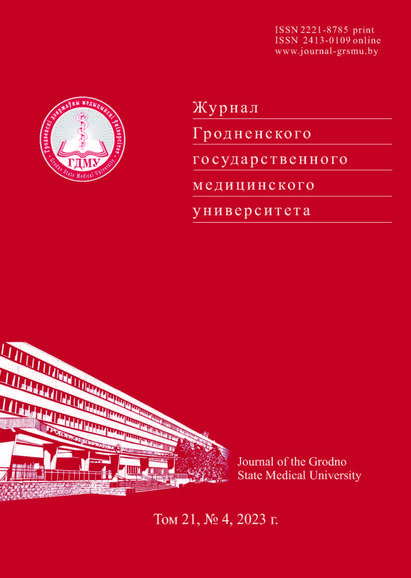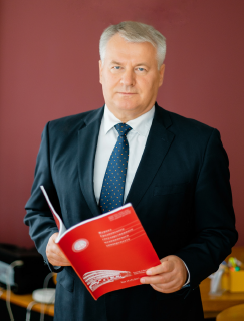РОЛЬ МИКРОБИОМА КИШЕЧНИКА В РАЗВИТИИ КОЛОРЕКТАЛЬНОГО РАКА, ВОЗНИКНОВЕНИИ НЕСОСТОЯТЕЛЬНОСТИ АНАСТОМОЗА В ПОСЛЕОПЕРАЦИОННОМ ПЕРИОДЕ
Аннотация
Колоректальный рак (КРР) – это распространенное заболевание с высоким уровнем смертности. КРР занимает третье место в мире по распространенности у мужчин и второе – у женщин, по версии Всемирной организации здравоохранения. В настоящее время наблюдается повышенный интерес к изучению взаимосвязи между микробиомом кишечника и развитием КРР. Изменения в микробиоме кишечника у пациентов, страдающих КРР, указывают на возможную роль взаимодействия хозяина и микробов в возникновении и развитии этой злокачественной опухоли, в то же время открывают возможности для новых способов профилактики, диагностики и лечения этого заболевания. Данный обзор направлен на рассмотрение определенных аспектов влияния микробиома кишечника на развитие КРР и некоторых сопутствующих заболеваний.
Литература
Fiorentini C, Carlini F, Pia Germinario EA, Maroccia Z, Travaglione S, Fabbri A. Gut microbiota and colon cancer: a role for bacterial protein toxins? Int J Mol Sci. 2020;21:132-153. https://doi.org/10.3390/ijms21176201.
Gargi A, Reno M, Blanke SR. Bacterial toxin modulation of the eukaryotic cell cycle: are all cytolethal distending toxins created equally? Front Cell Infect Microbiol. 2012;2:124. https://doi.org/10.3389/fcimb.2012.00124.
Buc E, Dubois D, Sauvanet P, Raisch J, Delmas J, Darfeuille-Michaud A, Pezet D, Bonnet R. High prevalence of mucosa-associated E. coli producing cyclomodulin and genotoxin in colon cancer. PLoS One. 2013;8(2):e56964. https://doi.org/10.1371/journal.pone.0056964.
van Elsland D, Neefjes J. Bacterial infections and cancer. EMBO Rep. 2018;19(11):e46632. https://doi.org/10.15252/embr.201846632.
Arthur JC, Perez-Chanona E, Mühlbauer M, Tomkovich S, Uronis JM, Fan TJ, Campbell BJ, Abujamel T, Dogan B, Rogers AB, Rhodes JM, Stintzi A, Simpson KW, Hansen JJ, Keku TO, Fodor AA, Jobin C. Intestinal inflammation targets cancer-inducing activity of the microbiota. Science. 2012;338(6103):120-3. https://doi.org/10.1126/science.1224820.
Zamani S, Taslimi R, Sarabi A, Jasemi S, Sechi LA, Feizabadi MM. Enterotoxigenic Bacteroides fragilis: A Possible Etiological Candidate for BacteriallyInduced Colorectal Precancerous and Cancerous Lesions. Front Cell Infect Microbiol. 2020;9:449. https://doi.org/10.3389/fcimb.2019.00449.
Chung L, Thiele Orberg E, Geis AL, Chan JL, Fu K, DeStefano Shields CE, Dejea CM, Fathi P, Chen J, Finard BB, Tam AJ, McAllister F, Fan H, Wu X, Ganguly S, Lebid A, Metz P, Van Meerbeke SW, Huso DL, Wick EC, Pardoll DM, Wan F, Wu S, Sears CL, Housseau F. Bacteroides fragilis Toxin Coordinates a Pro-carcinogenic Inflammatory Cascade via Targeting of Colonic Epithelial Cells. Cell Host Microbe. 2018;23(2):203-214. https://doi.org/10.1016/j.chom.2018.01.007.
Rubinstein MR, Wang X, Liu W, Hao Y, Cai G, Han YW. Fusobacterium nucleatum promotes colorectal carcinogenesis by modulating E-cadherin/β-catenin signaling via its FadA adhesion. Cell Host Microbe. 2013;14(2):195-206. https://doi.org/10.1016/j.chom.2013.07.012.
Jobin C. Colorectal cancer: looking for answers in the microbiota. Cancer Discov. 2013;3(4):384-387. https://doi.org/10.1158/2159-8290.CD-13-0042.
Sobhani I, Tap J, Roudot-Thoraval F, Roperch JP, Letulle S, Langella P, Corthier G, Tran Van Nhieu J, Furet JP. Microbial dysbiosis in colorectal cancer (CRC) patients. PLoS One. 2011;6(1):e16393. https://doi.org/10.1371/journal.pone.0016393.
Mima K, Nishihara R, Qian ZR, Cao Y, Sukawa Y, Nowak JA, Yang J, Dou R, Masugi Y, Song M, Kostic AD, Giannakis M, Bullman S, Milner DA, Baba H, Giovanucci EL, Garraway LA, Freeman GJ. Fusobacterium nucleatum in colorectal carcinoma tissue and patient prognosis. Gut. 2016;65(12):1973-1980. https://doi.org/10.1136/gutjnl-2015-310101.
Srivastana A, Walter N, Atkinson P. Streptococcus bovis infection of total hip arthroplasty in association with carcinoma of colon. J Surg Orthop Adv. 2010;19(2):125-8.
Yu YN, Fang JY. Gut microbiota and colorectal cancer. Gastrointest Tumors. 2015;2(1):26-32. https://doi.org/10.1159/000380892.
Cohn I, Rives JD. Antibiotic protection of colon anastomoses. Ann Surg. 1955;141(5):707-717. https://doi.org/10.1097/00000658-195505000-00016.
Alverdy JC. Microbiome medicine: this changes everything. J Am Coll Surg. 2018;226(5):219-729. https://doi.org/10.1016/j.jamcollsurg.2018.02.004
Ohigashi S, Sudo K, Kobayashi D, Takahashi T, Nomoto K, Onodera H. Significant changes in the intestinal environment after surgery in patients with colorectal cancer. J Gastrointest Surg. 2013;17(9):1657-1664. https://doi.org/10.1007/s11605-013-2270-x.
Alverdy JC, Hyman N, Gilbert J, Luo JN, Krezalek M. Preparing the bowel for surgery: learning from the past and planning for the future. J Am Coll Surg. 2017;225(2):324-332. https://doi.org/10.1016/j.jamcollsurg.2017.05.005.
Olivas AD, Shogan BD, Valuckaite V, Zaborin A, Belogortseva N, Musch M, Meyer F, Trimble WL, An G, Gilbert J, Zaborina O, Alverdy JC. Intestinal tissues induce an SNP mutation in Pseudomonas aeruginosa that enhances its virulence: possible role in anastomotic leak. PLoS One. 2012;7(8):e44326. https://doi.org/10.1371/journal.pone.0044326.
Iida N, Dzutsev A, Stewart CA, Smith L, Bouladoux N, Weingarten R, Molina DA, Salcedo R, Back T, Cramer S, Dai RM. Commensal bacteria control cancer response to therapy by modulating the tumor microenvironment. Science. 2013;342(6161):967-970. https://doi.org/10.1126/science.1240527.
Round JL, Mazmanian SK. The gut microbiota shapes intestinal immune responses during health and disease. Nat Rev Immunol. 2009;9(5):313-23. https://doi.org/10.1038/nri2515.
Lauka L, Reitano E, Carra MC, Gaiani F, Gacrilidis P, Brunetti F, de’Angelis N, Sobhani I. Role of the intestinal microbiome in colorectal cancer surgery outcomes. World J Surg Oncol. 2019;17(1):204. https://doi.org/10.1186/s12957-019-1754-xa.































